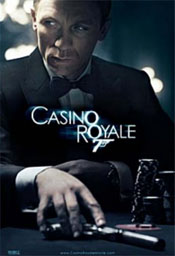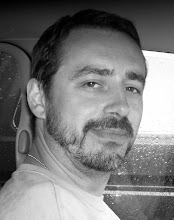 Casino Royale is the first Bond film since the end of Connery’s original run that feels like the stylistic heir to that era. And it captures more of the tone of Ian Fleming’s novels that any 007 movie since 1969’s On Her Majesty’s Secret Service. It is frankly startling that EON Productions, the makers of the 007 series, had the guts to reinvent the cinema Bond this drastically, but in taking this roll of the dice they have jolted the series to renewed creative life and have produced a film of surprising emotional depth, maturity, and genuine excitement. Casino Royale fits easily into the upper echelons of the 007 film series and, more than that, is one of the best films of 2006, no matter the genre.
Casino Royale is the first Bond film since the end of Connery’s original run that feels like the stylistic heir to that era. And it captures more of the tone of Ian Fleming’s novels that any 007 movie since 1969’s On Her Majesty’s Secret Service. It is frankly startling that EON Productions, the makers of the 007 series, had the guts to reinvent the cinema Bond this drastically, but in taking this roll of the dice they have jolted the series to renewed creative life and have produced a film of surprising emotional depth, maturity, and genuine excitement. Casino Royale fits easily into the upper echelons of the 007 film series and, more than that, is one of the best films of 2006, no matter the genre. Daniel Craig debuts as James Bond in a mesmerizing performance. Radiating charisma, grace, authority, and a killer instinct, Craig commands the screen. But there are added layers to his characterization, a vulnerability, a sense that Bond loses a piece of himself with each act of violence, a danger that he may bury his own soul. Bond is not invulnerable and unscarred; events effect him and leave their mark physically and psychologically. We see the first hints of Ian Fleming’s idea that James Bond enjoys liquor, the finer things in life, and women to sedate the damage inflicted by the constant danger his job involves. 007 really goes through the ringer in this film, bruised and bloodied and tortured, and Daniel Craig is utterly believable while still radiating the Bond style and essence. Those who criticized his casting can now hang their heads in shame.
Daniel Craig debuts as James Bond in a mesmerizing performance. Radiating charisma, grace, authority, and a killer instinct, Craig commands the screen. But there are added layers to his characterization, a vulnerability, a sense that Bond loses a piece of himself with each act of violence, a danger that he may bury his own soul. Bond is not invulnerable and unscarred; events effect him and leave their mark physically and psychologically. We see the first hints of Ian Fleming’s idea that James Bond enjoys liquor, the finer things in life, and women to sedate the damage inflicted by the constant danger his job involves. 007 really goes through the ringer in this film, bruised and bloodied and tortured, and Daniel Craig is utterly believable while still radiating the Bond style and essence. Those who criticized his casting can now hang their heads in shame. The supporting cast are uniformly strong. Eva Green plays Treasury agent Vesper Lynd with sharp intelligence, cool sexiness, and a hint of buried sadness. As main villain Le Chiffre, Danish actor Mads Mikkelsen contributes a quality never before seen in a Bond baddie – sympathy. Not to give too much away, but Le Chiffre has more to lose in the plot than Bond, and in one scene we almost feel sorry for him. As a result, Le Chiffre has more depth than any previous Bond villain, and it makes the character more believable and ramps up the danger when he has the drop on Bond in a sequence that will make all males in the audience wince. Judi Dench truly shines as M, embodying a tough, no-nonsense intelligence chief who can almost make Bond cower. The Bond and M scenes are some of the best written in the film and it will be interesting to see how their relationship develops in subsequent films. Actors Jeffrey Wright (as Felix Leiter) and Giancarlo Giannini (as Mathis) are memorable supporting players, playing Bond’s allies, though Wright has too little screen time. Overall, the cast has an international flavour missing from recent Bond outings.
The supporting cast are uniformly strong. Eva Green plays Treasury agent Vesper Lynd with sharp intelligence, cool sexiness, and a hint of buried sadness. As main villain Le Chiffre, Danish actor Mads Mikkelsen contributes a quality never before seen in a Bond baddie – sympathy. Not to give too much away, but Le Chiffre has more to lose in the plot than Bond, and in one scene we almost feel sorry for him. As a result, Le Chiffre has more depth than any previous Bond villain, and it makes the character more believable and ramps up the danger when he has the drop on Bond in a sequence that will make all males in the audience wince. Judi Dench truly shines as M, embodying a tough, no-nonsense intelligence chief who can almost make Bond cower. The Bond and M scenes are some of the best written in the film and it will be interesting to see how their relationship develops in subsequent films. Actors Jeffrey Wright (as Felix Leiter) and Giancarlo Giannini (as Mathis) are memorable supporting players, playing Bond’s allies, though Wright has too little screen time. Overall, the cast has an international flavour missing from recent Bond outings.Who would have thought that Martin Campbell, director of GoldenEye, could give a Bond film this much of a stylistic kick? Two sequences, one in stark black and white and one in jumpy, hallucinogenic colour, are unlike anything seen in a 007 film before. The overall look of the film is crisp and exotic, and the camera work frequently outstanding, especially in the claustrophobic tight shooting of a fight sequence in a stairwell that recalls the train fight in From Russia With Love, the best of the Bond films. Though the 007 series has never truly been director-driven, Casino Royale bears the stamp of a dexterous filmmaker.
 An excellent script helps. Sticking reasonably close to an Ian Fleming novel for the first time since 1969, screenwriters Neal Purvis, Robert Wade (scribes for the last two Brosnan Bonds) and Oscar-winner Paul Haggis have crafted a literate script that is well-paced and peppered with memorable dialogue. Like the Fleming novel, the story has a unique structure for a thriller, with the main story arc ending two-thirds of the way through and an emotional coda (albeit with a set piece added that is not in the book). The final act could have killed the momentum, but it remains interesting because of the attention to character and does eventually add to the main storyline. I won’t give anything away, but the very last scene of the film almost had me applauding. I can only hope the same attention to quality is paid to the script of the next Bond film.
An excellent script helps. Sticking reasonably close to an Ian Fleming novel for the first time since 1969, screenwriters Neal Purvis, Robert Wade (scribes for the last two Brosnan Bonds) and Oscar-winner Paul Haggis have crafted a literate script that is well-paced and peppered with memorable dialogue. Like the Fleming novel, the story has a unique structure for a thriller, with the main story arc ending two-thirds of the way through and an emotional coda (albeit with a set piece added that is not in the book). The final act could have killed the momentum, but it remains interesting because of the attention to character and does eventually add to the main storyline. I won’t give anything away, but the very last scene of the film almost had me applauding. I can only hope the same attention to quality is paid to the script of the next Bond film.With a John Barry-esque sweep, David Arnold's music contributes immensely to the success of Casino Royale. Deliberately avoiding the James Bond signature music until a key moment, the music weaves in a gorgeous orchestral version of the title song (which is an energetic punch of a rock song sung by Chris Cornell), dropping tantalizing hints of the 007 theme. It synergizes perfectly with the action on screen, adding vivacity and texture to key sequences.
There have been several honourable attempts to move 007 films back to their literary roots,1 but none have succeeded better than Casino Royale. For the first time in many years, “James Bond will Return” reads like a promise of great things to come.
1 Since the Connery James Bond films, On Her Majesty’s Secret Service (1969), For Your Eyes Only (1981), The Living Daylights (1987), Licence to Kill (1989) and, to a lesser extent, The World is Not Enough (1999) have attempted to return to Fleming minimalism.
---
Directed by Martin Campbell
Written by Neal Purvis & Robert Wade and Paul Haggis, based on the novel by Ian Fleming
Starring:
Daniel Craig....James Bond
Eva Green....Vesper Lynd
Mads Mikkelsen....Le Chiffre
Judi Dench....M
Jeffrey Wright....Felix Leiter
Giancarlo Giannini....Mathis
Caterina Murino....Solange



No comments:
Post a Comment